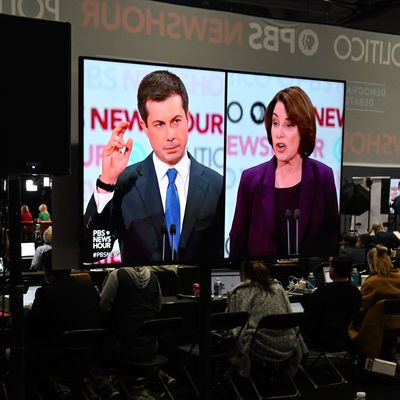
For a while, the sixth Democratic presidential debate in Los Angeles looked like one of those rare events when all the candidates sounded solid and substantive but didn’t mix it up much. A candidate who really needed a good debate, Amy Klobuchar, got a lot of airtime and sounded animated and fluid, if a bit over-the-top in advertising her down-home midwestern humor. A candidate who evaded an expected pile-on in the last debate in November, Pete Buttigieg, was cruising, too, with his usual smoothness punctuated by eloquence, until he picked a fight with Elizabeth Warren when she alluded to candidates (without naming them) who relied on bundled contributions. They went back and forth, but it probably didn’t help Mayor Pete that many viewers were soon searching for articles and images of a Silicon Valley wine cave where he held a lavish fund-raiser. To the extent that both these candidates are fighting for support among upscale college-educated voters, the clash could be significant.
It got more intense for Buttigieg, though, when Klobuchar, not for the first time, contrasted her experience and record of electability with Pete’s in an exchange that did not go well for the mayor of South Bend. After he quipped that he showed his chops in winning as “a gay dude in Pence’s Indiana,” the Minnesota senator quickly pointed out that Buttigieg had lost his one statewide race “by 20 points.”
Klobuchar trained her fire on Buttigieg for a very specific reason, beyond the fact that her long experience in Washington and in statewide politics contrasts sharply with his short résumé in supervising a small city. Mayor Pete sits precisely athwart the portion of the Iowa Democratic electorate that Klobuchar desperately needs to win over if she is to survive that contest and move on to other states as an electable-moderate-alternative-to-Joe-Bien. In the RealClearPolitics polling averages for Iowa, Buttigieg is at 22.0 percent and Klobuchar is at 6.3 percent. That needs to change pretty quickly if Klobuchar is to get a serious look.
The candidate, of course, who is the most important obstacle to both Buttigieg’s and Klobuchar’s ambitions is Joe Biden, who had one of his better debate performances (though he probably didn’t benefit from a question about his specific age, which may have come as a surprise to many viewers). The durability of Biden’s support has been one of the most remarkable stories of the 2020 nominating contest so far. But the “moderate lane” he is thought to dominate will accommodate at least one other candidate so long as concerns about Biden persist among both progressive activists and political pros.
We can probably expect continued pressure on Buttigieg from Klobuchar. She clearly relishes treating Pete as a product of white male privilege who hasn’t proven much of anything in his brief political career. And to the extent that Buttigieg keeps trying to hit an anti-Washington theme in his own campaign, he’ll likely return fire at the Senate veteran who is so proud of her experience in the nation’s capital.
Both candidates have little margin for error in fighting for a top-tier position in a race where the perpetual national front-runners, Biden, Sanders and Warren, aren’t going anywhere (Warren, who has lost some ground lately, is still well ahead of Buttigieg in national polls and Klobuchar everywhere). The fact that they had the most notable collision in a generally civil debate will draw attention to their competition going forward.






























